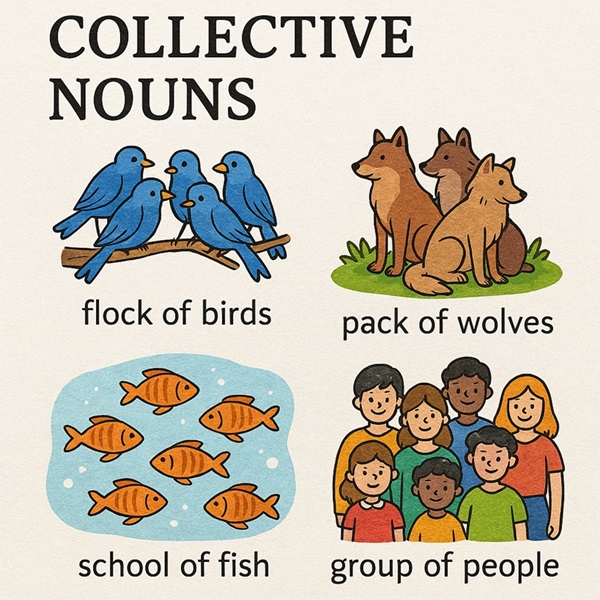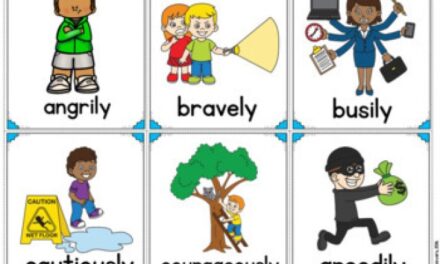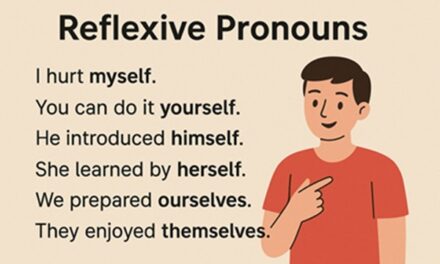Introduction
Language is full of surprises, and one of the most delightful aspects of English grammar is collective nouns—words that describe a group of people, animals, or things. While many of us are familiar with terms like a herd of cows or a flock of birds, there exist numerous lesser-known and amusing collective nouns that add charm and wit to our language. In this chapter, we will explore not only some unique and rare collective nouns but also some amusing stories and facts associated with them.
What Are Collective Nouns?
A collective noun is a single word used to refer to a collection of individuals, objects, or animals as a single entity. These words are often imaginative and descriptive, giving insight into the behavior or nature of the group they represent.
Uncommon and Quirky Collective Nouns
While we all know about a pack of wolves and a swarm of bees, here are some fascinating and lesser-known collective nouns:
For Animals:
- A murder of crows – This eerie term comes from old folklore associating crows with omens and death.
- A parliament of owls – Owls are often considered wise, so this group name reflects their supposed intelligence.
- A prickle of porcupines – Aptly named because of their sharp quills!
- A crash of rhinos – Reflects their heavy, thundering movement.
- A business of ferrets – Perhaps because ferrets always seem to be scurrying around busily!
- A kaleidoscope of butterflies – A poetic way to capture their dazzling colors.
- A shiver of sharks – Sounds like something from a suspense novel!
For People:
- A pomposity of professors – A humorous take on academia!
- A troupe of dancers – Perfectly describing performers moving in harmony.
- A giggle of girls – Capturing the sound of their laughter.
- A worship of writers – Because every writer secretly hopes their words are revered.
For Objects:
- A library of books – A fitting term for a collection of knowledge.
- A fleet of ships – Used to describe multiple ships traveling together.
- A cluster of stars – Often used in astronomy.
- A nest of tables – A common term in furniture design for stackable tables.
Amusing and Entertaining Facts about Collective Nouns
1. Many Collective Nouns Have Medieval Origins
Many quirky collective nouns originate from The Book of Saint Albans (1486), a medieval guide to hunting, fishing, and heraldry. The book included whimsical terms that were meant to be poetic rather than strict rules of language. Over time, some of these unusual terms stuck!
2. Some Collective Nouns Were Created as Jokes
Did you know that some modern collective nouns are invented just for fun? For instance, a whoop of gorillas is believed to have been humorously coined due to the loud, enthusiastic sounds gorillas make.
3. Collective Nouns Can Be Creative and Ever-Changing
Because English is an evolving language, new collective nouns continue to be invented. You might hear people jokingly refer to a gossip of bloggers or a tangle of cables—these aren’t official, but they make language lively!
4. Different Words for the Same Animal in Different Contexts
Did you know that the same group of animals might have different collective nouns depending on where they are? For example:
- A group of geese is called a gaggle on land but a skein when flying.
- Lions can be a pride, but they are also called a troop or a coalition in different situations.
Fun Activity: Create Your Own Collective Nouns!
Now that you’ve explored many unusual collective nouns, why not create your own? Think of an object, animal, or group of people, and come up with a name that describes them in a fun or poetic way. Here are a few suggestions to inspire you:
- A tangle of earphones
- A glow of fireflies
- A flurry of shoppers
Conclusion
Collective nouns are one of the most colorful and entertaining parts of the English language. They offer a glimpse into history, humor, and human imagination. Whether you’re talking about a leap of leopards or a dazzle of zebras, these words make language richer and more fun. Keep an ear out for new collective nouns—you never know when you’ll hear a clever one!
Did You Know?
Try using some of these unusual collective nouns in your everyday conversation! Instead of saying a group of butterflies, impress your friends by calling it a kaleidoscope of butterflies!

















